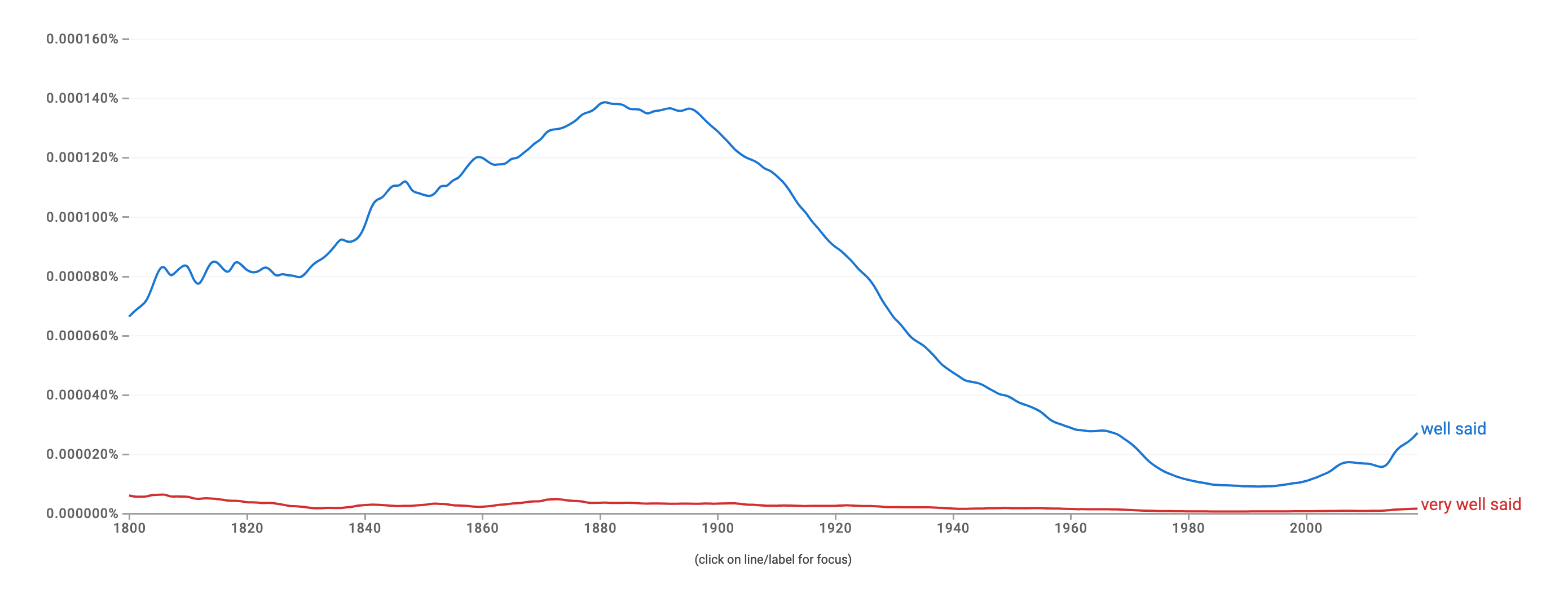- What is the meaning of "well said" and "very well said?" "Well said" and "very well said" are complimentary expressions used to acknowledge someone's effective communication. Adding "very" intensifies the compliment, suggesting a higher level of praise or admiration.
👏 The ambassador's speech on international relations was insightful and nuanced. Well said! (Appreciation for clarity and depth)
👏 Your closing argument was masterful, leaving no room for doubt. Well said! (Emphasis on persuasiveness and impact)
👏 The chairwoman's proposal for reform was well-considered and balanced. Well said! (Acknowledgement of thoughtful planning and presentation)
🖊️ Looking Forward to Speak with You vs. Looking Forward to Speaking with You: Which is Correct?
🖊️ Speak vs. tell
There's a certain magic to the phrase "well said." It's a simple compliment, yet it carries immense weight and meaning. It's a nod of approval, a recognition of insight, and a subtle way to express your agreement and admiration.

Meaning of well said
- Express agreement: "The speaker eloquently captured the complexities of the issue. Well said!"
- Acknowledge insight: "You brought up a point I hadn't considered before. Well said!"
- Show appreciation for someone's eloquence: "Your presentation was both informative and inspiring. Well said!"
- Offer encouragement in a debate: "Your opponent made some strong points, but I still agree with you. Well said!"
Meaning of very well said
- More emphatic and stronger: It expresses a higher degree of appreciation and admiration.
- Used for exceptional moments: It's more appropriate for situations where the speaker has truly excelled, delivering an insightful or impactful message.
- Carries a sense of awe and admiration: It suggests that you're not just impressed, but genuinely moved or inspired by the speaker's words.
Here's a table summarizing the key differences:
| Feature | Well said | Very well said |
|---|---|---|
| Intensity | Neutral | Strong |
| Formality | Formal and informal | More formal |
| Appreciation | Agreement and admiration | High degree of appreciation and admiration |
| Use cases | Acknowledgement, agreement, appreciation | Exceptional moments, impactful messages |
| Feeling expressed | Impressed | Awed and inspired |
Ultimately, the best choice depends on the context and the level of appreciation you want to express. If you're unsure, "well said" is always a safe option, while "very well said" can be reserved for truly outstanding moments.
In the graph below, we can also see that people use the phrase "well said" more frequently than the phrase "very well said," especially from the 1840s to the 1920s. Unfortunately, "well said" is used much less these days.

Using well said and very well said effectively
While straightforward, using "well said" effectively requires a touch of finesse. Here are some tips:
- Specificity is key: Instead of a generic "well said," add a phrase that explains why you're impressed. ("Your analogy of the butterfly really resonated with me. Well said!")
- Sincerity is essential: A genuine "well said" carries more weight than a forced one. Make sure your tone and expression match your appreciation.
- Timing matters: Saying "well said" right after someone finishes speaking might seem rushed. Wait for a natural pause or the end of a point to avoid interrupting.
- Context is crucial: "Well said" can feel out of place in casual conversations. Use it in situations where intellectual exchange or formal presentations are taking place.
Origins of the phrase: well said
Early Origins (Medieval Era):
- Similar phrases like "well spoken" and "well uttered" appeared in Middle English texts as early as the 14th century, often used to praise public speakers and writers.
- These phrases carried connotations of clarity, eloquence, and propriety in language use.
Formalization and Evolution (17th-19th Centuries):
- By the 17th century, "well said" emerged as a distinct phrase, often used in formal settings like courtrooms, parliaments, and literary circles.
- The rise of print media and public debates further solidified its role as a marker of approval and effective communication.
- Over time, "well said" transcended its formal roots and gained traction in everyday language.
Modern Usage and Nuances (20th-21st Centuries):
- In the 20th century, "well said" became commonplace, used in diverse contexts like speeches, presentations, casual conversations, and even online interactions.
- The phrase gained further nuance, with variations like "very well said," "perfectly said," and even ironic uses like "well said, indeed" conveying different levels of sincerity and sarcasm.
- Today, "well said" remains a versatile tool for expressing appreciation, agreement, and even encouragement.
Effects of using well said or very well said
"Well said"or "very well said: isn't just about words; it's about active listening and genuine appreciation. By using it thoughtfully, you can:
- Boost confidence: A well-placed "well said" can empower someone and encourage them to share their thoughts further.
- Foster dialogue: Appreciation creates a positive atmosphere, encouraging open and respectful communication.
- Show respect: A sincere "well said" acknowledges the value of someone's ideas and contributions.
So, go forth and spread the "well said" cheer! Remember, a little appreciation can go a long way in enriching conversations and fostering meaningful connections.
Want to sound like a native speaker?
Engram’s AI-powered grammar checker makes your English sound like a native speaker’s, suggesting natural English expressions on top of fixing grammar, spelling, punctuation, word order, and vocabulary.

References:














